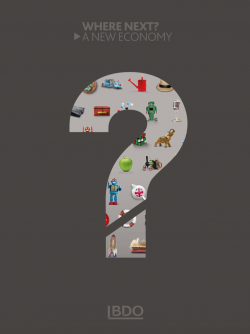3 minute read
Mid-sized businesses outperform the rest of UK plc
“Overlooked and undervalued” mid-sized businesses created more jobs in the UK over the last 12 months than the nation’s large and small companies combined, according to new figures published by accountancy and advisory firm, BDO.
The new analysis shows that mid-sized businesses created 534,900 jobs in the last 12 months compared to a loss at FTSE 350 firms of 157,000 jobs and an increase of small business jobs of 191,000.
Mid-sized businesses have also grown faster and generated greater profit growth in the last five years than their smaller and larger counterparts.

The BDO New Economy report shows mid-sized businesses have grown faster and generated larger profit growth over last five years than small businesses and large companies / Picture: Getty/iStock
• Mid-sized businesses have grown faster and generated larger profit growth over last five years than small businesses and large companies
• These ‘economic engine’ companies created half a million jobs in the last 12 months – more than the FTSE350 and small businesses combined
• Economic engine businesses make up around 0.5% of all companies by number but account for one third of all private sector revenue and jobs
• BDO urges government to put overlooked mid-sized businesses at the heart of its thinking for a post-Brexit economy
These high-growth, entrepreneurial and ambitious businesses, which BDO calls the UK Economic Engine, punch well above their weight, accounting for only 0.5% of all UK businesses (29,000) but over one third of UK revenue (£1.3tn) and almost 1 in 3 private sector jobs.
Yet despite such a pivotal role, mid-sized businesses risk being overlooked as the UK prepares to leave the European Union, according to the ‘New Economy’ report published by BDO.
The ‘New Economy’ report outlines a series of policies aimed at boosting the UK economic engine. Ideas include radically simplifying the UK tax system, focusing on smaller ‘shovel-ready’ infrastructure projects to boost connectivity and productivity and a suite of ideas on improving UK skills.
BDO defines the UK economic engine as being a combination of privately owned businesses with a revenue of between £10-£300million, private-equity owned businesses and AIM listed companies. Large businesses were defined as those in the FTSE350 and small businesses defined as those with a revenue below £10million.
Paul Eagland, Managing Partner at BDO said: “These high-growth, high-energy and highly-entrepreneurial companies will be the difference between success and failure in our post-Brexit economic future. Yet despite their pivotal role in the UK economy these mid-sized businesses fall into a policy-gap. Too big to benefit from the policies aimed at small businesses but too small to command the attention of Government like the FTSE 350, the UK’s mid-sized businesses are too frequently overlooked and undervalued.
“The UK economic engine is playing its part by recording strong levels of revenue and profit growth and by creating jobs. Whilst it’s fair to say the Government has taken some good steps forward to support business we’d like to see a greater focus on skills, infrastructure investment and tax simplification.”
BDO’s New Economy report can be downloaded below
Summary of key research
| Turnover (2017) | Turnover (2016) | Turnover (2012) | Turnover (increase on 2016) | Turnover (increase on 2012) | |
Economic engine |
£1.30tn | £1.21tn | £984bn | 7.24% | 32.56% |
FTSE 350 |
£1.87tn | £1.68tn | £1.89tn | 11.68% | -0.68% |
Small businesses |
£144bn | £178bn | £147bn | -19.01% | -2.19% |
| Profit (2017) | Profit (2016) | Profit (2012) | Profit (increase on 2016) | Profit (increase on 2012) | |
Economic engine |
£111bn | £93bn | £76bn | 18.6% | 45.77% |
FTSE 350 |
£122bn | £85bn | £217bn | 43.69% | -43.50% |
Small businesses |
£20.1bn | £9.85bn | £18.93bn | 104% | 6.63% |
| Employees (2017) | Employees (2016) | Employees (2012) | Employees (increase 0n 2016) | Employees (increase 0n 2012) | |
Economic engine |
7.81m | 7.28m | 5,23m | 7.35% | 49.38% |
FTSE 350 |
7.11m | 7.27m | 6.47m | -2.16% | 9.84% |
Small businesses |
1.69m | 1.49m | 1.06m | 12.75% | 58.17% |

